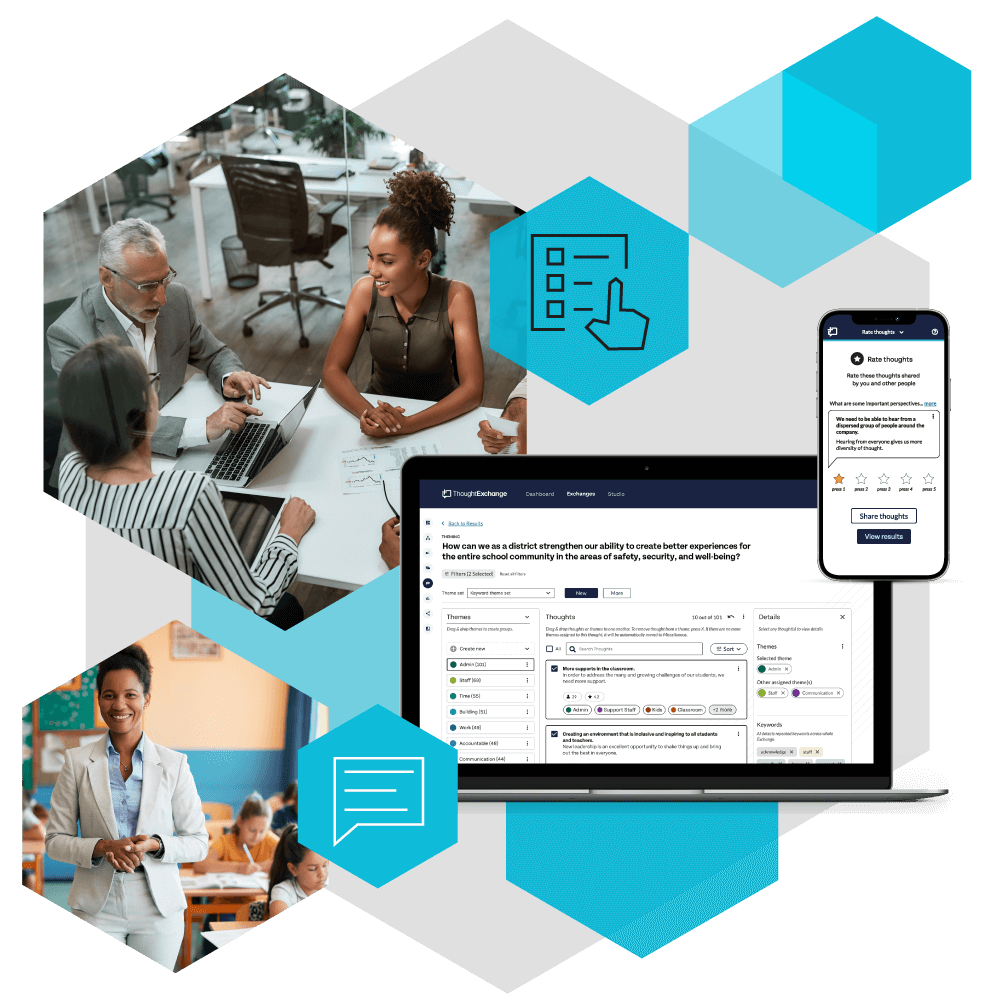Technology & AI in Public Engagement: 4 Civic Experts Weigh In











Do you remember your first email address? Your first online order? Your first social media account?
While these tools are a part of our lives today, they were once new, unexplored technology that only a brave few embraced.
We’re in the middle of another significant technological advancement with AI. Some people are scared of the unknown and the potential pitfalls—others enthusiastically apply it in their workplaces and communities.
As a company that has been using AI in our product for a decade, we wanted to bring leaders together to talk about how it’s changing the way they approach public engagement.
In this Article
In partnership with the Consulate General of Canada in Atlanta and the Atlanta Trade Commission, we hosted a panel of government and education experts to discuss the evolving role of AI in public engagement. Our experts shared how they use AI to solve real-world challenges in governments and schools.
Our panel featured Nikhil Deshpande, Chief Digital Officer for the State of Georgia; Yolanda Williamson, Ed.D, Chief of Community Engagement for DeKalb County School District; Eric Stirgus, K-12 Education Editor for the Atlanta Journal-Constitution Newspaper; and Keith Osburn, Ed.D, Chief Information Officer/Deputy Superintendent of Technology Services for the Georgia Department of Education.
Each panelist discussed how AI is impacting their fields and highlighted some outstanding use cases. Read on to learn how they see AI impacting the way we work in civic organizations, and how the right public engagement is key to adopting AI responsibly and effectively.
The State of Georgia assesses webpage readability across 95 sites
“AI is testing how good we are at changing and adapting.”As Chief Digital Officer for the State of Georgia, Nikhil Deshpande keeps his eye on the present and future of the technology that shapes our daily lives. He noted that every few years, we introduce technology that “shakes the system,” and he sees AI as “the next catalyst, the next changemaker” that some will adopt early and others will need more time to embrace. Deshpande has seen firsthand how AI can help government streamline back-end processes to solve problems.
Deshpande shared how his department leveraged AI to identify an issue they would have missed. The State of Georgia hosts 95 websites with over 400M pageviews monthly. Deshpande’s team aims to keep their content at a middle-school reading level.
He noted that every few years, we introduce technology that “shakes the system,” and he sees AI as “the next catalyst, the next changemaker”
Ensuring that their content is consistent across so many websites is difficult—and identifying any necessary changes would be a massive time and financial commitment. With an AI tool, his team scanned its 95 websites and found that only 20% of the content could be categorized as middle school level. The majority was high school and college level reading.
AI quickly pinpointed the content that needed updating and directed the team’s efforts to update it. Deshpande feels that it would be almost impossible for human beings to identify an issue like this at scale the way AI did.
However, he said, implementing the AI technology is easy— identifying where the problems lie, and the best solutions, is what’s hard. He feels that’s where we need to lean into human perspectives and feedback. Deshpande emphasized the importance of first understanding what people need—prioritizing the human perspective to understand how to use AI the right way.
From 365 days to 22 seconds: GDoE’s Early Warning System
“We're finding ways for AI to enhance your capacity to do the job you want to do.”Dr. Keith Osburn, Chief Information Officer/Deputy Superintendent of Technology Services for the Georgia Department of Education (GDoE), discussed how an AI pilot program is transforming the way Georgia secondary schools identify students in need of intervention.
The Georgia Department of Education is looking to partner AI with school counselors to improve the efficiency of its Early Warning System (EWS)—a data system that helps educators identify students who are at risk of not graduating or missing other key education milestones.
The current EWS requires school counselors to keep track of student attendance, behavior, and course proficiency—a lengthy process that can overwhelm counselors and leave less time for intervention. GDoE’s EWS pilot program uses AI to go through the thousands of school records and flag the students who may meet the criteria for intervention based on GDoE’s standards.
“A counselor at a school of 1,400 students may take a year to find 15 kids who need intervention in order to graduate. Now we can do that in about 22 seconds,” he explains.
“A counselor at a school of 1,400 students may take a year to find 15 kids who need intervention in order to graduate. Now we can do that in about 22 seconds,”
However, Dr. Osburn points out that while AI can speed up the process of flagging kids for possible intervention, the counselor has the final call. He explains that the counselor can determine whether the disruption in the student’s learning is just temporary, or whether it requires intervention from the school.
The EWS AI pilot program is intended to enhance the counselor’s job, not replace it. Dr. Osburn believes that using AI in this way can provide an inlet into the school system, and build trust in AI’s utility in education.
DeKalb County School District gains community trust with AI-powered engagement
“AI can make educators more efficient, and enhance how we serve our community—but it will never replace the human touch.”Dr. Yolanda Williamson, DeKalb CSD’s Chief of Community Engagement, acknowledges current fears around using AI in education—but she also sees how her district’s changing demographics require new engagement strategies.
With her district’s parent demographic made up of the tech-savvy Millennial generation, she’s seen how traditional in-person engagement doesn’t resonate like it used to. “Town hall meetings aren’t bringing community members into the conversation anymore. But regardless of the community that we’re trying to hear from—they all have phones.”
Using ThoughtExchange—which allows participants to engage with the district through any device at any time—Dr. Williamson has seen how AI can transform public engagement. She explained how the platform’s AI analytics were able to uncover challenges her team thought were already solved, and quickly analyze the community’s insights to identify actionable solutions.
“Because of AI, it takes me 30 seconds to get a report and determine what's next in terms of what we need to discuss and what actions we need to take to move forward.”
Dr. Williamson shared how ThoughtExchange has been instrumental in connecting DeKalb’s senior leadership and community members, using our platform to hear from their Superintendent Advisory Councils at their monthly meetings. With their Bilingual Council, Parent Council, and Student Council, Dr. Williamson’s team has used ThoughtExchange to quickly gather priorities, dig into individual topics, and pinpoint actions to address community needs.
Our AI has transformed Dr. Williamson’s job in terms of efficiency and how effectively she can spend her time acting on community feedback. “Because of AI, it takes me 30 seconds to get a report and determine what's next in terms of what we need to discuss and what actions we need to take to move forward.”
DeKalb has also used ThoughtExchange as a key engagement platform to develop its MIRACLES Framework, the district’s strategic plan to improve education quality and academic and operational performance to improve student outcomes. Our platform enabled DeKalb’s leadership to gather quality data from a broad range of community members to inform its 8 areas of focus—a process that could take months without the instant, in-depth analysis our proprietary AI specializes in.
As a result of the way ThoughtExchange’s AI has improved DeKalb CSD’s quantity and quality of engagement, Dr. Williamson is optimistic about AI’s future role in education. Similarly to Dr. Osburn, she sees AI as a tool that can enhance the work educators do rather than replace it. In the right applications, such as with an AI-powered experience and engagement platform like ThoughtExchange, AI makes accessing the human insights of large groups faster and easier.
Avoiding AI pitfalls through better digital and media literacy
“We have to be diligent about independently verifying information and images for accuracy and correctness—especially this year with the presidential election.”Eric Stirgus, K-12 Education Editor for the Atlanta Journal-Constitution Newspaper, expressed a nuanced perspective on integrating AI in both education and journalism. He discussed how newsrooms like his explore and experiment with AI, while acknowledging that the human perspective is vital to journalism.
At the Atlanta Journal-Constitution, his team has experimented with using AI to send a tailored evening newsletter based on the reading habits of each subscriber. However, he emphasized that the paper’s other daily newsletters are all developed by the journalists themselves, who choose the content to share based on their experience with the Journal-Constitution’s readers.
While Sturgis sees some practical applications for AI in journalism, he flagged the increasing potential for misinformation, especially in an election year. Generative AI has made creating content that may draw from unreliable sources easier than ever—whether it’s images, video, or text.
He stressed that the rise of AI in journalism and education calls for increased digital and media literacy, especially with students. Teaching kids to identify misinformation and look for multiple reliable sources of information when researching or consuming news and social media content will be vital for the “AI generation.”
Teaching kids to identify misinformation and look for multiple reliable sources of information when researching or consuming news and social media content will be vital for the “AI generation.”
Sturgis believes this starts with educators understanding how AI is being used now, and how it may be used in the future, so that they can teach kids critical thinking skills and avoid the pitfalls of AI for both education and journalism. As a parent, Sturgis also has discussions with his son to help him understand online misinformation and critical thinking.
“Using good common sense, researching, and teaching students to use multiple sources. I talk about it with my son—don't believe something you see on Instagram or YouTube, look for several different sources.”
Striking a balance between artificial and human intelligence
The evolving role of AI in public engagement is sparking many meaningful conversations, like the one we hosted with our panel of civic experts. Nikhil Deshpande, Dr. Keith Osburn, Dr. Yolanda Williamson, and Eric Stirgus shared their invaluable experiences with using AI in government, education, and journalism.
AI offers unprecedented opportunities to streamline processes, enhance efficiency, and amplify community engagement. Whether it's optimizing webpage readability, revolutionizing student intervention systems, fostering community trust, or reshaping journalism practices—AI is proving to be a powerful tool for progress.
However, while AI can make jobs easier and more efficient, it’s vital to prioritize human perspectives in our use of AI for public engagement. At ThoughtExchange, that means using AI in responsible, safe ways to amplify community voices and gain even deeper insights from engagement data.
Instead of replacing human intelligence with artificial intelligence, we use AI to elevate people’s perspectives, allowing leaders to get instant insights into their communities and take fast action to support them.
As we continue to explore the frontiers of AI integration, it's imperative to strike a balance between harnessing its potential and safeguarding against its pitfalls, ensuring that AI’s benefits are realized responsibly and inclusively for the betterment of society.




